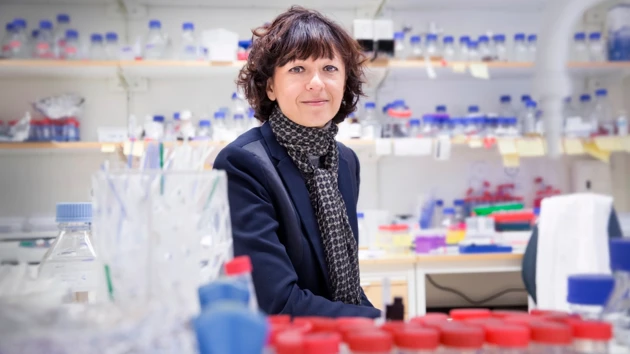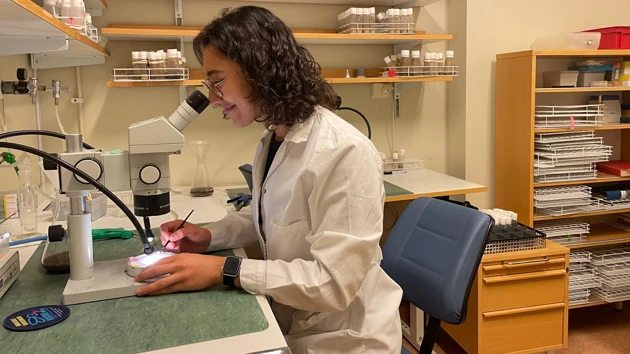Bachelor of Science Programme in Life Science 180 credits

About the programme
The Bachelor’s programme in Life Science focuses on life, bridging chemistry and biology to explore living systems. Our teachers have close links to outstanding research in areas such as microbiology, medicinal chemistry, biochemistry, infectious medicine, and plant and forest biotechnology. After completing the programme, you can call yourself a chemist, molecular biologist or both, as you have the opportunity to finish your education with a double Bachelor's degree in both these subject areas.
Laboratory work with state-of-the-art equipment
International study environment
Specialize in chemistry or molecular biology
Programme overview
-
Chemistry
30%
-
Molecular Biology
30%
-
Elective courses
32%
-
Thesis project
8%
While studying
What is Life Sciences?
Life Sciences cannot be defined by only one field of studies; rather, at its core, it is based on chemistry and molecular biology. In order to provide a university education in Life Science, we have therefore chosen to place the program at two departments - Department of Chemistry and Department of Molecular Biology. In this way, we can have experts teaching on the programme in all areas. And since all teachers are researchers, we have strong research links to important applications in society.
Nobel Prize in 2020 for CRISPR-Cas9
As a strong testament of this, the Nobel Prize in Chemistry in 2020 was awarded to Emmanuelle Charpentier who was active at Umeå University when the CRISPR-Cas9 method was developed.

The first and second year of the Life Science programme gives you a fundamental knowledge of chemistry and molecular biology. During the third year you may choose to specialize in these fields by taking advanced courses or broaden your knowledge in other subjects. The programme ends with a thesis project during which you will have the chance to apply your knowledge in the lab.
Year 1
Biological chemistry
Fundamentals of chemistry
Biochemistry
Organic chemistry
Year 2
Microbiology and basic molecular biology
Basic and molecular genetics
Cell biology
Animal and plant physiology
Year 3
Breadth and depth through optional courses
Degree thesis in Chemistry or Molecular Biology
Double bachelor's degree
After studying the Life Science programme, you can call yourself a chemist, molecular biologist or both. You have the opportunity to finish your education with a double bachelor's degree in both of these fields of study, a double bachelor's degree requires only half a semester of extra study.
A mix of theory and practical lab work
The teaching includes a varied mix of lectures, lessons, group work, seminars and practical laboratory work with a particular focus on problem-solving. In the laboratory exercises, you will apply modern techniques to investigate chemical and molecular biological processes. Since all courses include practical laboratory work, you will have the opportunity to strengthen your self-confidence and ability to work effectively in a laboratory.
Meet one of your teachers: Teresa Frisan
All teaching in English
All course literature and instruction are in English. This will not only prepare you for working in the highly international life science field but also gives you the possibility to study one or two semesters abroad at one of our many partner universities.
Read more about studying abroad: interview with Ida Bengtsson
Choose programme specialisation
Future and career opportunities
The programme provides you with the theoretical and practical skills you need in your future work life and the work prospects are good. As a chemist or molecular biologist you can for example work in pharmaceutical and biotech companies, often with research, or development and communication. You could also work as an environmental consultant, company leader, salesperson, investigator, or science journalist.
The programme provides an excellent foundation for continuing your education with, for example, a master's degree at Umeå University or elsewhere in Sweden or the world. In addition, the programme opens the opportunity to continue within academic research.
We also have an active industry council to connect companies and the labour market in Life Science to the programme through guest lectures, information sessions, online events and career fairs.
A stated goal of being leading life-science nation
Sweden has a national strategy for life science with a stated goal of being a leading life-science nation. In Sweden alone there are thousands of companies and the sector is growing rapidly both internationally, in Sweden, and in Umeå.
Read more about life science companies in the Umeå region
Common jobs
The Life Science programme provides a broad foundation with excellent opportunities to get jobs e.g:
• In the development of new drugs and vaccines at pharmaceutical companies
• In medical technology
• At diagnostics companies, be able to make diagnostics
• Linked to criminology
• Production and development of e.g. food and makeup
• In project management and as a consultant in the entire life science sector
• In addition to this opportunity to continue in research!
Further studies?
The Bachelor of Science Programme in Life Science qualifies for further studies on advanced level. A Master's degree provides a good basis for doctoral studies, but also increases your overall competitiveness on the labour market.
Masterprogram
Programme directors


Apply
Choose specialisation when you apply to the programme
Choose programme specialisation
Film about the programme
The Life Science programme builds the basis and during the third year you specialize in chemistry or molecular biology.
Voices about the programme
-

Eleonora works on the production of antibodies
Alumni
The possibility to study in English attracted Eleonora Hedin to the Bachelor's programme in Life Science. Following her degree she works at Nordic Biomarker producing antibodies for healthcare purposes.
-

The Bachelor's degree was only the beginning - now Elin is a doctoral student
Alumni
"I really like it up north and Umeå University has such a good reputation" says Elin Vikström. "It was really both the city and the programme that attracted me." She studied the Life Science programme and then went on to master's and doctoral studies.
-

High ambitions attracted Michael to Umeå
Alumni
Michael Baumgärtner from Germany knew he wanted to study abroad. Finding a university in Europe with a good education system was a priority. He chose between Finland and Sweden, and at Umeå University he found the right programme for him, the Bachelor's programme in Life Science.
-

Inés researches about mechanisms in chromosomes
Alumni
"I felt like I had a lot to learn about the available disciplines within biology before I could choose one" says Inés Hernandez Crego. She felt the Bachelor's programme in Life Science offered a broad base.
Frequently asked questions
What is Life Science?
The Bachelor's Programme in Life Science provides students with a broad competence in chemistry and molecular biology. Career paths include pursuing a Master’s degree and having an academic career, or working in biotech industries with research and development, and communication.
What is required for a Bachelor’s degree in chemistry and/or molecular biology?
180 credits in total, 90 credits need to be within chemistry or molecular biology, 15 credits need to be at bachelor’s level and 15 credits need to be a thesis at bachelors level.
Read more about degree requirements
What courses are at the bachelor’s level/G2F?
It is courses that have prerequisites of at least 60 credits within the field or at least 120 credits in total.
How do I find a research group/supervisor for my bachelor’s thesis?
As a student you are responsible for contacting a supervisor/research group with the help of the teacher responsible for the course.
Read more about research groups:
https://www.umu.se/en/faculty-of-science-and-technology/research/research-groups/
https://www.umu.se/en/faculty-of-medicine/research/research-groups/
https://www.umu.se/en/department-of-medical-and-translational-biology/research/research-groups/
https://www.umu.se/en/ucmr/ucmr-organisation/
Is it possible to write your thesis at another university in Sweden/abroad?
Yes, but we require that you have a co-supervisor from Umeå University.
Is the programme conducted in English or Swedish?
The education is conducted in English.
Is it possible to take a degree in both chemistry and molecular biology?
Yes, it is possible to do so if you fulfil the requirements for the degree. You need 180 credits in total, of which 90 credits need to be within the field of chemistry or molecular biology, 15 credits need to be the thesis and at least 15 credits need to at a G2F level. For more information please contact study guidance.
Where can I find contact information for the programme?
For more information about the programme, please email lifescience.chemistry@umu.se.
Contact us
Your message goes to Infocenter, and they’ll make sure it gets to the right person – so you get the best and most relevant reply.
